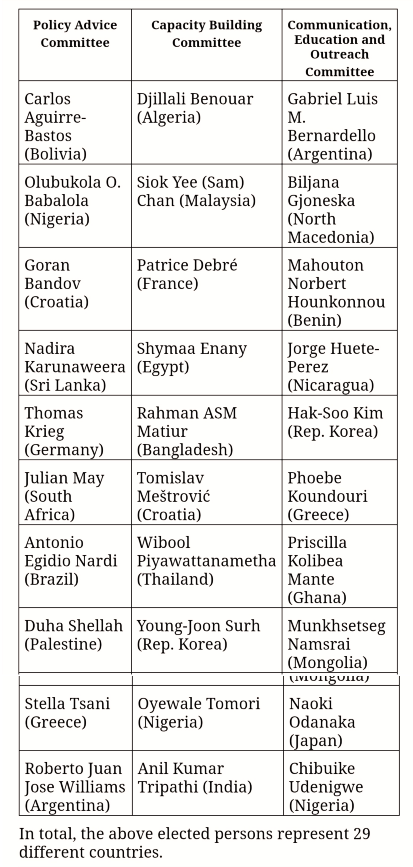The Inter-Academy Partnership, a global network of over 150 merit-based sciences, medical and engineering academies, has announced the results of its 2025 leadership election, alongside an expansion in its membership.
The Inter-Academy Partnership (IAP)’s incoming leadership reflects a strong mix of continuity and fresh perspectives, representing diverse regions and disciplines from around the world.
The InterAcademy Partnership is hosted by The World Academy of Sciences for the advancement of science in developing countries (TWAS) in Trieste.
In preparation for the upcoming IAP Triennial Conference and General Assembly, to be held in Cairo, Egypt, from 8-11 December 2025, IAP conducted online elections in accordance with its Statutes.
The just released results mark a new chapter in IAP’s ongoing commitment to inclusive and globally representative scientific leadership.
The members elected to the Board are:
· Stephanie Burton (South Africa) – re-elected for a second term
· Marileen Dogterom (Netherlands)
· Peggy Hamburg (USA) – re-elected for a second term
· Helena Bonciana Nader (Brazil)
· Gianfranco Pacchioni (Italy) – re-elected for a second term
· Carmencita Padilla (Philippines).
As outlined in IAP’s Statutes, the Board includes three members from high-income countries and three from low- and middle-income countries.
It is supported by an Advisory Committee and three Programme and Development Committees, ensuring a robust and representative governance structure.
The Advisory Committee comprises a total of 12 members.
The members elected to the Advisory Committee in 2025 are:
· Ghada Bassioni (Egypt)
· Ranieri Guerra (Italy)
· Dorothea Hilhorst (Netherlands)
· Guang Ning (China) – re-elected for a second term
· Frances Separovic (Australia) – re-elected for a second term.
As per the IAP Statutes, these elected members will be joined on the Advisory Committee by representatives of IAP’s four Regional Networks.
These are the Association of Academies and Societies of Sciences in Asia (AASSA), the European Academies’ Science Advisory Council (EASAC), the Inter-American Network of Academies of Sciences (IANAS) and the Network of African Science Academies (NASAC)).
Representatives of the academies in the hosting countries, that is the Accademia Nazionale dei Lincei and The World Academy of Sciences for the advancement of science in developing countries (TWAS) in Italy, and the National Academy of Sciences in the United States also hold ex officio seats on the Advisory Committee.
Together, these 12 members will provide strategic guidance to the IAP Board and ensure regional and institutional perspectives are well represented in IAP’s activities and programmes.
“The Accademia Nazionale dei Lincei is delighted to welcome the new governance of IAP. The ballot results – conducted with great care and high participation from the partner academies – demonstrate a strong balance of nationality, gender, and qualifications among the elected members. This reflects IAP’s continued commitment to competent governance and a focus on inclusion and fairness,” said Lincei academy President Roberto Antonelli.
“Our academy’s longstanding partnership with IAP reflects our shared commitment to leveraging science in pursuit of evidence-based solutions to the world’s most complex challenges. We look forward to contributing to IAP’s mission in the years ahead.”
Marcia McNutt, President of the US National Academy of Sciences, added: “I warmly congratulate the new leadership of the InterAcademy Partnership.
IAP continues to play an essential role in bringing together academies from around the world to exchange knowledge, foster collaboration, and strengthen the global scientific community. We look forward to continued partnership in the years ahead.”
Each of IAP’s three Programme and Development Committees will comprise 10 members.
To ensure strong coordination across all levels of leadership, members of the IAP Board and Advisory Committee will serve as co-chairs of the Programme and Development Committees.
The members elected to the three Programme and Development Committees are:

In addition to the election of individuals to the IAP leadership, the online polling of IAP members also confirmed the following academies as full members of IAP:
· Azerbaijan National Academy of Sciences
· Cyprus Academy of Sciences, Letters and Arts
· Academia Nacional de la Ingeniería y el Habitat, Venezuela
This brings the total of IAP member academies to 153.
The change of IAP leadership, and the formal accession of the four above academies, will take place at the IAP General Assembly on 11 December 2025, hosted by the Academy of Scientific Research and Technology (ASRT), in Cairo, Egypt.

